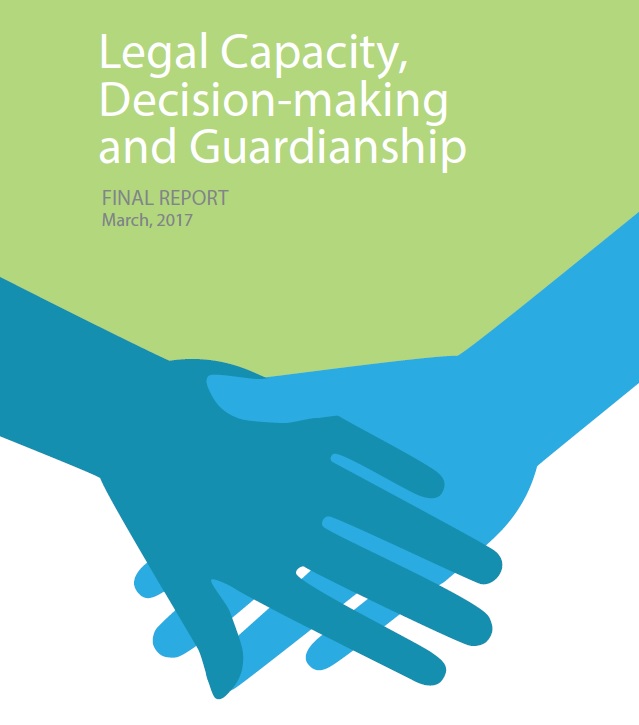Project Purpose
The Law Commission of Ontario’s (LCO) Final Report on Legal Capacity, Decision-making and Guardianship recommends a comprehensive plan to reform Ontario’s laws and policies regarding powers of attorney, guardianship and health care consent.
Ontario’s laws for legal capacity, decision-making and guardianship govern how decisions related to property, treatment and personal care are made in situations where individuals’ decision-making abilities are in some way impaired, but decisions must nonetheless be made.
These laws have a profound impact on the wellbeing of the individuals addressing both the protection of the autonomy of affected individuals and the risks of abuse and exploitation of individuals who may be vulnerable.
This project responds to public concerns regarding:
- Misuse of powers of attorney;
- Inappropriate interventions in lives of elderly Ontarians and Ontarians with disabilities;
- Complex, lengthy and costly resolution of legal disputes;
- Widespread lack of understanding among individuals, families, health and legal professionals, institutions, community agencies, and others; and,
- Need to update Ontario’s laws in light of significant impact of demographic, legal, and social changes since these laws were introduced.
The LCO’s report is the most comprehensive analysis of Ontario’s framework governing legal capacity, decision-making and guardianship laws in nearly 30 years. Ontario’s current legislative regime for legal capacity, decision-making and guardianship took shape following several provincial reports in the late 1980s – early 1990s.
Key Areas for Reform
The Final Report’s 58 recommendations include proposals in six broad areas:
- Improving access to the law, in particular by greatly streamlining court-based mechanisms under the Substitute Decisions Act and promoting greater use of tribunals to reduce cost, complexity and time to resolve issues
- Promoting understanding of the law among family members, substitute decision-makers, professionals and service providers, and those whose rights are most immediately impacted by a legal finding or proceeding;
- Strengthening the rights protected under the Health Care Consent Act by improving the quality of capacity assessments and expanding the provision of rights information to those found incapable;
- Reducing inappropriate intervention by providing more options to persons who cannot make decisions independently, and creating more flexible and limited types of substitute decision-making appointments;
- Increasing accountability and transparency for personal appointments, so as to address widespread concerns regarding abuse and misuse use of powers of attorney and elder abuse; and,
- Enabling greater choice of substitute decision-makers, in response to the needs of the growing number of individuals who prefer families of choice, or who do not have family or close friends who are willing and able to take on this important role.
LCO Process
The Final Report was developed through LCO’s independent, comprehensive, evidence-based and transparent law reform process. The LCO heard from more than 800 individuals and institutions over the course of this project.
- The LCO’s Advisory Group included representatives from government, adjudicative bodies, the legal community, service providers, academics and experts, and several community and advocacy organizations.
- In 2013, the LCO had preliminary consultations with 70+ individuals and institutions;
- The LCO commissioned several expert research papers;
- In 2015, the LCO released a comprehensive Discussion Paper;
- In 2015, the LCO conducted extensive public consultations, including 30 focus groups, written submissions, consultation questionnaires, and numerous consultation events with individuals, families, professionals, and community groups;
- In 2016, the LCO released an Interim Report, including draft recommendations; and
- In March 2017, the LCO released its Final Report.
Project Documents
Interim Report and Summary of Issues and Proposed Recommendations – October 2015
Discussion Paper and Summary of Issues for Consultation – May 2014
Commissioned Research:
-
-
- Advocacy Centre for the Elderly and Dykeman Dewhirst O’Brien LLP: Health Care Consent and Advance Care Planning: Standards and Supports
- ARCH Disability Law Centre: Decisions, Decisions: Promoting and Protecting the Rights of Persons with Disabilities Who Are Subject to Guardianship
- Canadian Centre for Elder Law: Understanding the Lived Experiences of Supported Decision-making in Canada
- Dr. Bonnie Lashewicz: Understanding and Addressing Voices of Adults with Disabilities Within Their Family Caregiving Contexts
- Sophie Nunnelley: Personal Support Networks in Practice and Theory: Assessing the Implications for Supported Decision-Making Law
-

